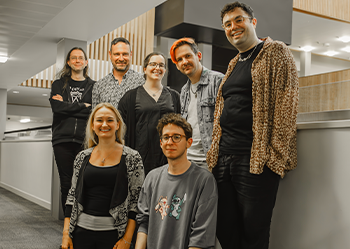University News Last updated 29 May 2024

What have Playboy and the Mafia got in common? A strong and perhaps unexpected connection with play and video games, say scholars who attended the History of Games 2024 conference at Birmingham City University (BCU).
For the internationally renowned event, 80 experts from 18 countries representing almost 40 institutions met in Birmingham to discuss the theme of ‘Families’ in gaming.
Dr Regina Seiwald, a former PhD student at BCU, delivered one of three keynote talks, sharing insights from her research into the Mafia and video games.
“What’s more family than the Mafia?!” she said. “Family structures are at the core of the Mafia’s organisation – and, as game players, we get immersed into these families.”
Dr Seiwald highlighted how both the Mafia and a Mexican drug cartel had used video games to recruit people to carry out criminal activities on their behalf.
"In 2021, Forbes reported that a Mexican drug cartel used Grand Theft Auto Online to recruit someone to transport narcotics – and not electronics as agreed – across the border,” she said.
“This incident highlights the far-reaching influence of gangs, such as the Mafia, and inspired me to explore the relationship between the Mafia and video games in my research.”
Dr Thomas Apperley, Senior Research Fellow in the Centre of Excellence in Game Culture Studies at Tampere University in Finland, discussed how the Playboy legacy had shaped thoughts about play in the 20th century.
During his research into game cultures and pornography, he said he had realised that the Playboy brand was “turning up a lot” and “presented play as a masculine technique of self-mastery and seduction that women can’t join effectively”.
He added: “As a community, we’re thinking deeply about how we map the heritage of games. It’s essential we talk about and contextualise these things as important historical artefacts, remembering that there are also problematic aspects tied into some of their ideas.
“At first, Playboy was aimed at men’s leisure, which included popular culture phenomena such as board games and comic books. Playboy appealed because it discussed these topics and other hobbies in a serious and ‘masculine’ way before specialist hobby magazines existed.”
John Szczepaniak, a writer and game historian documenting the lives and careers of video game developers, gave a keynote address on forgotten lineages and untold histories in games.
“Developers today making hugely popular games, such as Elden Ring, often drawing inspiration from older, forgotten titles they enjoy,” he said.
“It’s about tracing how games have influenced each other to create a cognitive DNA or lineage of ideas that are passed from one developer to another.
“Games are part of our cultural fabric. They’re integrated into every aspect of our lives, from our formative years to growing up and playing video games with our children or families. I hope people will feel excited about the stories behind games and be inspired to dig deeper.”
Nick Webber, Associate Professor in Media at BCU, said the conference had been a “big success”, adding: “Three great keynote talks and 59 excellent presentations from 73 authors stimulated some vibrant and engaging discussions and exposed gaps for future research.
“It’s the first time the History of Games community has come together in person since 2018 and it has reminded us how vital these events are. They introduce new scholars to colleagues from across the world and produce opportunities for new international collaboration.
“One delegate remarked they haven’t been to a conference they enjoyed this much for years!”